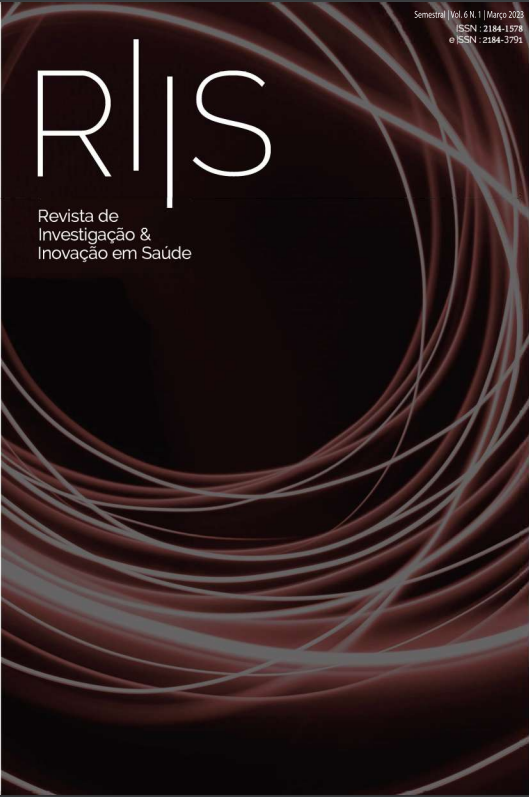Conhecimento sobre o regime medicamentoso das pessoas idosas: estudo descritivo
DOI:
https://doi.org/10.37914/riis.v6i1.260Keywords:
Idoso, conhecimento, polimedicação, adesão à medicaçãoAbstract
Background: The aging of the population, with a high incidence of chronic diseases and the prescription of a complex drug regimen requires knowledge and capacity for its effective and safe management. Polymedication, inherent to chronic health conditions, entails complications that may arise from the elderly people's inadequate knowledge about the management of the drug regimen.
Objective: To characterize the knowledge about the medication regimen of the elderly.
Methodology: Quantitative, cross-sectional and descriptive study. The sample consisted of 23 elderly people who attend day centers belonging to the municipalities of Vale de Cambra, São João da Madeira and Oliveira de Azeméis. Data collection was carried out through the questionnaire “Patient's knowledge about their medications” (CPM-PT-PT) adapted and validated for the Portuguese population by Rubio et al (2014).
Results: The level of knowledge of the elderly about medicines is sufficient in relation to the drug regimen. The dimension with the greatest knowledge is the “Usage Process”, however the knowledge in the “Safety” dimension is lower compared to the other dimensions.
Conclusion: In view of the results, nursing interventions are needed to increase knowledge about the drug regimen, promoting health and preventing complications.
References
Bosch-Lenders, D., Maessen, D. W. H. A., Stoffers, H. E. J. H. (Jelle), Knottnerus, J. A., Winkens, B., & van den Akker, M. (2016). Factors associated with appropriate knowledge of the indications for prescribed drugs among community-dwelling older patients with polypharmacy. Age and Ageing, 45(3), 402–408. https://doi.org/10.1093/ageing/afw045 DOI: https://doi.org/10.1093/ageing/afw045
Didone, T. V. N., García-Delgado, P., Melo, D. O. de, Romano-Lieber, N. S., Martínez, F. M., & Ribeiro, E. (2019). Validação do questionário “Conocimiento del Paciente sobre sus Medicamentos” (CPM-ES-ES). Ciência & Saúde Coletiva, 24(9), 3539–3550. https://doi.org/10.1590/1413-81232018249.26112017 DOI: https://doi.org/10.1590/1413-81232018249.26112017
Didone, T. V. N., Melo, D. O. de, Lopes, L. da C., & Ribeiro, E. (2020). Conhecimento inadequado sobre medicamentos prescritos e seus preditores em pacientes muito idosos e seus cuidadores. Revista Brasileira de Geriatria e Gerontologia, 23(3). https://doi.org/10.1590/1981-22562020023.20019 DOI: https://doi.org/10.1590/1981-22562020023.200193
Dixe, M. A. (2022). Validação e Adaptação de instrumentos de Medida. In M. Néné & C. Sequeira (Eds.), Investigação em Enfermagem. Teoria e Prática (pp. 51–69). Lidel.
Frõhlich, S. E., Dal Pizzol, T. S., & Mengue, S. S. (2010). Instrumento para avaliação do nível de conhecimento da prescrição na atenção primária. Revista de Saúde Pública, 44(6), 1046-1054. https://search.bvsalud.org/gim/resource/pt/lil-565077 DOI: https://doi.org/10.1590/S0034-89102010000600009
García Delgado, P., Gastelurrutia Garralda, M. Á., Baena Parejo, M. I., Fisac Lozano, F., & Martínez Martínez, F. (2009). Validación de un cuestionario para medir el conocimiento de los pacientes sobre sus medicamentos. Atención Primaria, 41(12), 661–668. https://doi.org/10.1016/j.aprim.2009.03.011 DOI: https://doi.org/10.1016/j.aprim.2009.03.011
Halli-Tierney, A. D., Scarbrough, C., & Carroll, D. (2019). Polypharmacy: Evaluating Risks and Deprescribing. American Family Physician, 100(1), 32-38. www.aafp.org/afp
Hartweg, D. L. (2015). Dorothea Orem’s Self-Care Deficit Nursing Theory. In M. C. Smith & M. E. Parker (Eds.), Nursing Theories and Nursing Practice (4th ed., pp. 105–132). F. A. Davis Company
Hernández-Rodríguez, M. Á., Sempere-Verdú, E., Vicens-Caldentey, C., González-Rubio, F., Miguel-García, F., Palop-Larrea, V., Orueta-Sánchez, R., Esteban-Jiménez, Ó., Sempere-Manuel, M., Arroyo-Aniés, M. P., Fernández-San José, B., de Juan-Roldán, J. I., & Ioakeim-Skoufa, I. (2021). Drug Prescription Profiles in Patients with Polypharmacy in Spain: A Large-Scale Pharmacoepidemiologic Study Using Real-World Data. International Journal of Environmental Research and Public Health, 18(9), 4754. https://doi.org/10.3390/ijerph18094754 DOI: https://doi.org/10.3390/ijerph18094754
Kurczewska-Michalak, M., Lewek, P., Jankowska-Polańska, B., Giardini, A., Granata, N., Maffoni, M., . . . Kardas, P. (2021). Polypharmacy Management in the Older Adults: A Scoping Review of Available Interventions. Frontiers in Pharmacology, 12, 1-15. doi:10.3389/fphar.2021.734045 DOI: https://doi.org/10.3389/fphar.2021.734045
Lavrador, M. T. (2016). Polimedicação no pessoas idosas. (Tese de mestrado). Faculdade de Medicina da Universidade de Coimbra. https://estudogeral.sib.uc.pt/bitstream/10316/37135/1/Mariana%20Lavrador.pdf
Masnoon, N., Shakib , S., Ellett, L. K., & Caughey, G. E. (2017). What is polypharmacy? A systematic review of definitions. BMC Geriatrics, 17(230), 1-10. doi:10.1186/s12877-017-0621-2 DOI: https://doi.org/10.1186/s12877-017-0621-2
Muth, C. B.-G. (2019). Evidence supporting the best clinical management ofpatients with multimorbidity and polypharmacy: a systematic guideline review and expert consensus. Journal of Internal Medicine, 285(3), 272-288. doi: 10.1111/joim.12842 DOI: https://doi.org/10.1111/joim.12842
Orem, D. (2001). Nursing: Concepts of Practice (6th ed.). Mosby.
Orem, D. (2003a). Nursing Theories and Their Function as Conceptual Models for Nursing Practice and Curriculum Development. In K. Renpenning & S. G. Taylor (Eds.), Self-Care Theory in Nursing. Selected Papers of Dorothea Orem. (pp. 108–120). Springer Publishing Company
Orem, D. (2003b). Validity in Theory: A Therapeutic Self-Care Demand for Nursing Practice. In K. Renpenning & S. G. Taylor (Eds.), Self-Care Theory in Nursing. Selected Papers of Dorothea Orem. (pp. 98–107). Springer Publishing Company
Pereira, F., Verloo, H., Zhivko, T., Giovanni, S. D., Massetti, C. M., Gunten , A. v., . . . Wernli, B. (2021). Risk of 30-day hospital readmission associated with medical conditions and drug regimens of polymedicated, older inpatients discharged home: a registry-based. BMJ Open, 1-12. doi:10.1136/bmjopen-2021-052755 DOI: https://doi.org/10.1136/bmjopen-2021-052755
Perera, T., Ranasinghe, P., Perera, U., Perera, S., Adikari, M., Jayasinghe, S., & Constantine, G. R. (2012). Knowledge of prescribed medication information. BMC Research Notes, 1-8. http://www.biomedcentral.com/1756-0500/5/658 DOI: https://doi.org/10.1186/1756-0500-5-658
Petronilho, F. A. (2013). A alta hospitalar do doente dependente no autocuidado: Decisões, destinos, padrões de assistência e de utilização dos recursos. (Tese de Doutoramento em Enfermagem). Universidade de Lisboa. https://repositorio.ul.pt/handle/10451/10572
Pinto, A., Rodrigues, T., Mendes, J., Bação, F., & Lobo, V.(2013). Medication and Polymedication in Portugal. In Recent Developments in Modeling and Applications in Statistics (pp.59-68). Berlin, Heidelberg: Springer Berlin Heidelberg. https://doi.org/10.1007/978-3-642-32419-2_7 DOI: https://doi.org/10.1007/978-3-642-32419-2_7
Rankin, A., Cadogan, C. A., Patterson, S. M., Kerse, N., Cardwell, C. R., Bradley, M. C., … Hughes, C. (2018). Interventions to improve the appropriate use of polypharmacy for older people. Cochrane Database of Systematic Reviews, 2018(9). https://doi.org/10.1002/14651858.CD008165.pub4 DOI: https://doi.org/10.1002/14651858.CD008165.pub4
Rubio, J. S. (2014). Conocimiento del paciente sobre sus medicamentos en el área metropolitana gran Lisboa (Portugal). Adaptácion transcultural y validacion del cuestionario CPM. Obtido de http://hdl.handle.net/10481/48528
Sanches, M. I. (2020). Polimedicação no pessoas idosas. (Tese de Mestrado em evidência e decisão em saúde). Faculdade de Medicina da Universidade do Porto. https://repositorio-aberto.up.pt/bitstream/10216/131372/2/435335.pdf
Downloads
Published
How to Cite
Issue
Section
License
Copyright (c) 2023 Sónia Novais, Daniela Abreu, Lídia Magro, Pedro Gilde, Sónia Pereira, Catarina Bastos, Maribel Carvalhais

This work is licensed under a Creative Commons Attribution 4.0 International License.















